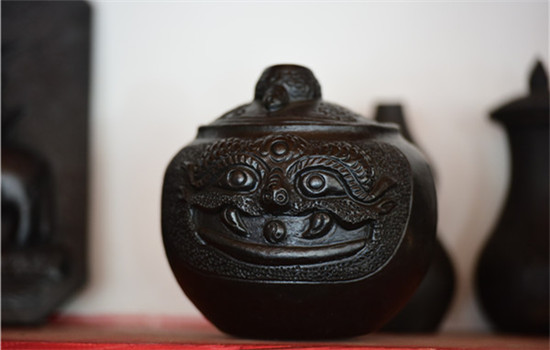
Ancient images on the pots. (CHEN CHUANGYE/CHINA DAILY)
Many travelers to Shangri-La, a county-level city in Southwest China's Yunnan province, will likely pass Tangdui village in Nixi township without paying much attention to it.
After all, there's so much to see-British author James Hilton's fictional place of Shangri-La in his 1930s' novel Lost Horizon, is said to have been inspired by the city.
Nevertheless, Tadrin Phuntsok, a 45-year-old resident of Tangdui who runs a roadside store that sells black pottery works such as pots, has reasons for optimism.
Nixi is known for its stewed chicken, often served in earthen pots. It is a hub of traditional Tibetan craftsmanship and it was listed as a nation-level intangible cultural heritage in 2006.
"It (Nixi pottery) was unknown to the outside world for a long time," says Tadrin Phuntsok, a seventh-generation potter in his family. "They were mainly exchanged for crops rather than being sold before the 1990s, when some overseas travelers came and bought them.
"I even didn't know how to charge," he recalls. "I sold each piece for a few yuan, but they would want to pay me much more than that."
The pots are usually decorated with ancient Tibetan images such as deities and are completely handmade. Tadrin Phuntsok reveals the materials are produced locally.
"Each family has its own unique formula," he says.
Among about 880 villagers in Tangdui, there are more than 100 pottery artisans, and Tadrin Phuntsok is considered among the best.
Though in the 1980s, there were only a few families that had inherited the tradition, many more were encouraged to join after he began to sell his pots.
"I once sold the pots on the Bund. I expected to sell them for 250 yuan ($37) in total, but a foreigner came and bought all for 400 yuan," he says of a 1997 sale in Shanghai where a Romanian diplomat bought the wares.
Earlier, such items were more popular with overseas buyers than domestic collectors, but in the past three years that's changed. The Chinese have now taken the lead.


















































